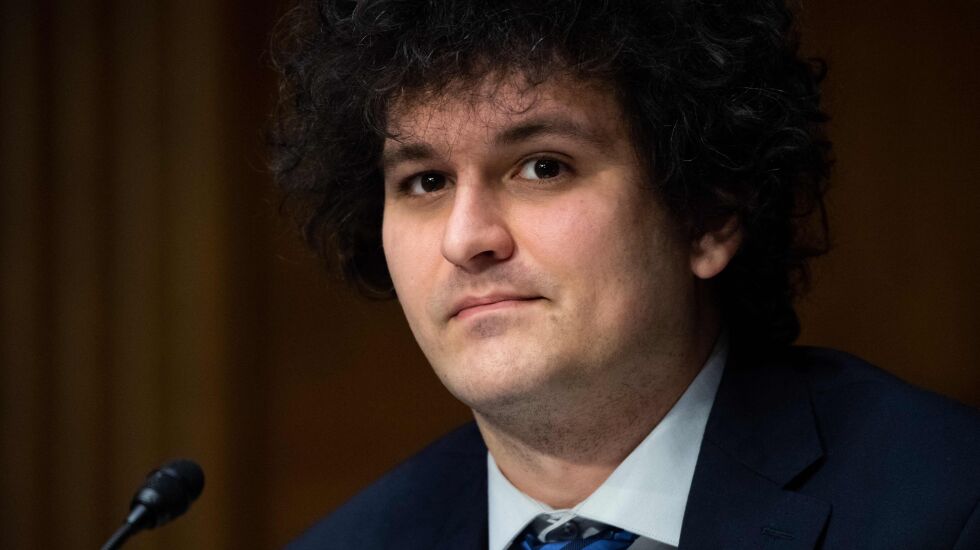
NEW YORK — U.S. prosecutors charged Sam Bankman-Fried, the founder and former CEO of cryptocurrency exchange FTX, with a host of financial crimes and campaign finance violations on Tuesday, alleging he played a central role in the rapid collapse of FTX and hid its problems from the public and investors.
The indictment says Bankman-Fried allegedly committed a yearslong fraud by diverting investors’ funds to his private hedge fund and using the money to make venture investments, lavish real estate purchases and large political donations.
Bankman-Fried, who arrested Monday by Bahamian authorities at the request of the U.S. government, was charged with eight counts, ranging from wire fraud to money laundering to conspiracy to commit fraud on the United States. He was also charged with making more than $25,000 in illegal campaign contributions, a notable charge as Bankman-Fried was one of the largest political donors this year.
The indictment is on top of civil charges announced earlier Tuesday by the Securities and Exchange Commission, which also alleged Bankman-Fried defrauded investors and used proceeds from investors to buy real estate on behalf of himself and family.
Along with the charges, U.S. authorities will seek to have Bankman-Fried forfeit all financial gains he might have received as part of the scheme. They are expected to request his extradition to the U.S., although the timing of that request is unclear. FTX filed for bankruptcy on Nov. 11, when it ran out of money after the cryptocurrency equivalent of a bank run.
The maximum potential prison exposure from these charges is 115 years, according to Nicholas Biase, a prosecutors spokesperson.
Since FTX collapsed, Bankman-Fried has been holed up in his Bahamian luxury compound in Nassau. A spokesman for Bankman-Fried had no immediate comment on the charges Tuesday. He has a right to contest his extradition, which could delay but probably not stop his transfer to the U.S.
Bankman-Fried was one of the world’s wealthiest people on paper; at one point his net worth reached $26.5 billion, according to Forbes. He was a prominent personality in Washington, donating millions of dollars toward mostly left-leaning political causes and Democratic political campaigns, though he also gave money to Republicans.
FTX grew to become the second-largest cryptocurrency exchange in the world and had its U.S. headquarters in Chicago’s Fulton Market.
That all unraveled quickly last month, when reports called into question the strength of FTX’s balance sheet. Customers moved to withdraw billions of dollars, but FTX could not meet all the requests because it apparently had used its customers’ deposits to fund investments at Bankman-Fried’s trading arm, Alameda Research.
“We allege that Sam Bankman-Fried built a house of cards on a foundation of deception while telling investors that it was one of the safest buildings in crypto,” said SEC Chair Gary Gensler.
The SEC complaint alleges that Bankman-Fried had raised more than $1.8 billion from equity investors since May 2019 by promoting FTX as a safe, responsible platform for trading crypto assets.
Instead, the complaint says, Bankman-Fried diverted customers’ funds to Alameda Research without telling them.
“He then used Alameda as his personal piggy bank to buy luxury condominiums, support political campaigns, and make private investments, among other uses,” the complaint reads. “None of this was disclosed to FTX equity investors or to the platform’s trading customers.”
Alameda did not segregate FTX investor funds and Alameda investments, the SEC said, using that money to “indiscriminately fund its trading operations,” as well as other ventures of Bankman-Fried.
Bankman-Fried’s arrest came just a day before he was due to testify in front of the House Financial Services Committee. Rep. Maxine Waters, D-Calif., chairwoman of the committee, said she was “disappointed” that the American public, and FTX’s customers, would not get to see Bankman-Fried testify under oath.
That hearing, however, will be held Tuesday, with the new CEO of FTX, John Ray III, giving testimony.
Bankman-Fried said recently that he did not “knowingly” misuse customers’ funds, and said he believes his millions of angry customers will eventually be made whole.
The SEC challenged that assertion Tuesday in its complaint.
“FTX operated behind a veneer of legitimacy Mr. Bankman-Fried created by, among other things, touting its best-in-class controls, including a proprietary ‘risk engine,’ and FTX’s adherence to specific investor protection principles and detailed terms of service. But as we allege in our complaint, that veneer wasn’t just thin, it was fraudulent,” said Gurbir Grewal, director of the SEC’s Division of Enforcement.
“FTX’s collapse highlights the very real risks that unregistered crypto asset trading platforms can pose for investors and customers alike,” Grewal said.

.png?w=600)





